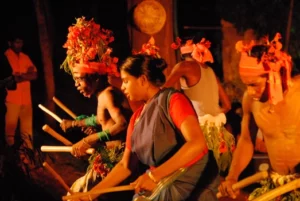In a significant move, families from the Jenu Kuruba tribe have recently started returning to their ancestral lands located within the Nagarhole National Park, marking a crucial moment in their long-standing struggle for forest rights.

About the Jenu Kuruba Tribe
- The Jenu Kurubas, categorized as a Particularly Vulnerable Tribal Group (PVTG), predominantly inhabit the Mysore and Kodagu districts in the state of Karnataka.
- Their name derives from the Kannada word “jenu,” meaning honey, indicative of their traditional livelihood centered on honey collection, foraging, and use of forest produce.
- Traditionally, their sustenance has been closely linked to forest ecosystems and small landholdings.
- They are also known by other names such as “Then Kurumba” and “Kattu Naikar”, and their villages are referred to as “Hadi”.
Social Structure and Lifestyle
- The Jenu Kurubas follow a semi-nomadic lifestyle and operate largely outside formal state structures, such as police, religious institutions, or centralized administrative systems.
- Their community governance includes a hierarchical setup with a secular leader (Yajamana) and a ritual specialist (Gudda). While the Gudda oversees spiritual matters, the Yajamana manages the day-to-day communal functions.
Religious Beliefs and Cultural Practices
- Their belief system centers on supernatural entities and ancestral deities, with strong emotional and spiritual attachment to these forces.
- The Jenu Kurubas express their culture and devotion through songs and dances, often focused on agriculture, folklore, marriage rituals, and mythological narratives.




